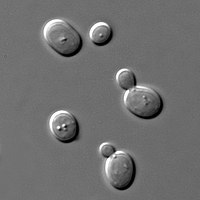
Photo from wikipedia
Yeasts involved in the spontaneous fermentation of traditional beverages like chicha (indigenous Andean beer) may have the potential to be used as starter cultures to improve the quality and microbiological… Click to show full abstract
Yeasts involved in the spontaneous fermentation of traditional beverages like chicha (indigenous Andean beer) may have the potential to be used as starter cultures to improve the quality and microbiological safety of these products, but also as non-conventional alternatives to other food alcoholic fermentations. In this research, we isolated, identified and characterised yeast strains from four Ecuadorian chichas made by using four different raw materials: rice (RC), oat (OC), grape (GC) and a mixture of seven corn varieties (yamor, YC). Finally, 254 yeast isolates were obtained and identified by molecular methods. Eleven yeast genera and 16 yeast species were identified with relatively few isolates belonging to Saccharomyces cerevisiae (9.1% belonging to 6 strains) and Torulaspora delbrueckii (18.6% belonging to 2 strains). In order to select good candidates for fermentative starter production, different analyses were performed. The results of the stress response tests showed a wide variability between species and strains, and identified some yeasts displaying high stress tolerance, similarly to commercial wine strains. Amylase production was screened as being indicative of the capacity to degrade and ferment starch-rich substrates. A Cryptococcus sp. isolate showed the highest amylase activity. The growth rate and fermentative capacity in molasses medium was measured for three S. cerevisiae, T. delbrueckii and Candida sp. strains as tests for yield and performance in biomass production. Based on their excellent behaviour, three S. cerevisiae strains and one T. delbrueckii strain were selected for further analyses, including dehydration tolerance and invertase activity as additional desired traits for chicha starters. All the S. cerevisiae strains exhibited high invertase activity and one also displayed high resistance to dehydration. The yeasts selected in this study can thus be suitably used as dry starters for the microbiologically controlled production of traditional beverages, and also for other alcoholic fermentations.
Journal Title: International journal of food microbiology
Year Published: 2019
Link to full text (if available)
Share on Social Media: Sign Up to like & get
recommendations!